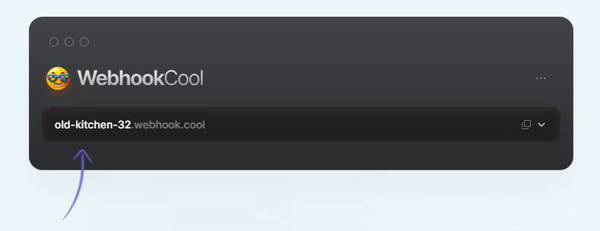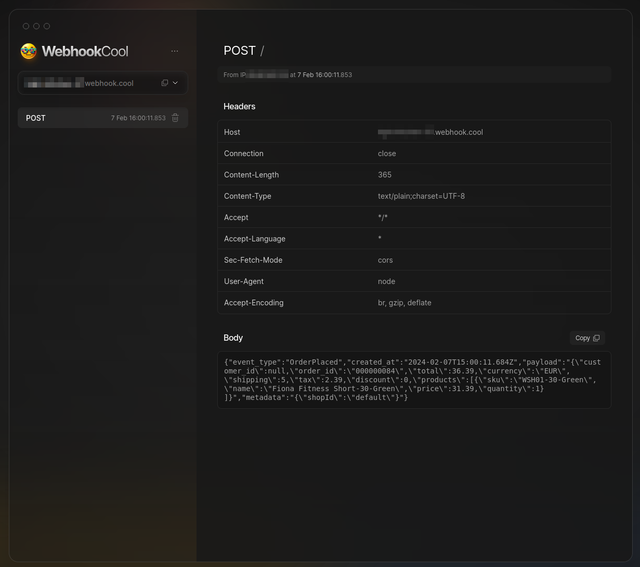Create an integration
This guide explains how to create integration to dispatch events to external services.
We will create a new integration to dispatch events to Webhook.cool.
Create an integration file
First you need to create a file for the integration. For this example, we will
name our integration Coolwebhook and will create a new file in
app/server-events/integrations/CoolWebhookIntegration.ts.
Integrations classes must implement the Integration interface from
@front-commerce/core/server-events/integrations. Copy this code in the newly
created file:
import type { Integration } from "@front-commerce/core/server-events/integrations";
export default class CoolWehbookIntegration implements Integration {
compatibleEvents: string[] | "*" = "*";
webhookId: string; // this is the id of the unique WebhookCool url to use (e.g: `old-kitchen-32` for https://webhook.cool/at/old-kitchen-32)
constructor(webhookId: string) {
this.webhookId = webhookId;
}
handle(messageId: string, payload: any) {
console.log(messageId);
console.log(payload);
}
}
In this class, we have two entities :
compatibleEvents: this indicates which events the integration will handle, it can be*to handle all events or an array of string that contains compatible events.handle: this is the method that will be called when an event is received.
For your integrations, only compatibleEvents and handle are required, the
webhookId and the constructor is an example of custom method and properties
that you can implement into your integrations.
Write specific code for your integration
Now we need to implement to logic which sends the event to external service
Since Webhook.cool is a minimalist services, we can use a single fetch call to
send the event :
import type { Integration } from "@front-commerce/core/server-events/integrations";
export default class CoolWehbookIntegration implements Integration {
compatibleEvents: string[] | "*" = "*";
webhookId: string;
constructor(webhookId: string) {
this.webhookId = webhookId;
}
handle(messageId: string, payload: any) {
fetch(`https://${this.webhookId}.webhook.cool`, {
method: "POST",
body: JSON.stringify(payload),
});
}
}
Here, we are posting the raw event details to the webhook, but feel free to manipulate it's data freely to adapt it to your specific integration.
You can find the data format for the payload object in the FAQ section.
Register your integration
Now that our integration is created, we have to register it in Front-Commerce.
To do this in a newly created app, you can register your new integration in the
app/config/serverEvents.ts configuration file:
import { ConsoleIntegration } from "@front-commerce/core/server-events/integrations";
import CoolWehbookIntegration from "../server-events/integrations/CoolWehbookIntegration";
export default {
redis: {
host:
process.env.FRONT_COMMERCE_SERVER_EVENT_REDIS_HOST ||
process.env.FRONT_COMMERCE_CLOUD_REDIS_HOST ||
process.env.FRONT_COMMERCE_REDIS_HOST ||
"127.0.0.1",
port:
process.env.FRONT_COMMERCE_SERVER_EVENT_REDIS_PORT ||
process.env.FRONT_COMMERCE_CLOUD_REDIS_PORT ||
process.env.FRONT_COMMERCE_REDIS_PORT ||
6379,
},
integrations: [
new ConsoleIntegration(),
new CoolWehbookIntegration("old-kitchen-32"),
],
};
You need to replace old-kitchen-32 with your Webhook ID, you can find it on
the Webhook.cool page

Test your integration
We are now ready to test your integration !
Please be sure to read the run local Server Event Worker guide before testing your integration.
Then let's try to send an event by going to the server event test page http://localhost:4000/__front-commerce/test/events and check out the Webhook.cool page.
